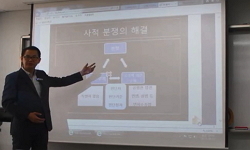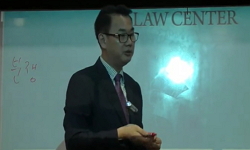The U.S. federal and state civil procedures are divided into two stages: pretrial and trial. At the pretrial stage, the plaintiffs and the defendants prepare for trial by means of pleading, discovery and other ancillary proceedings. Most cases are dis...
http://chineseinput.net/에서 pinyin(병음)방식으로 중국어를 변환할 수 있습니다.
변환된 중국어를 복사하여 사용하시면 됩니다.
- 中文 을 입력하시려면 zhongwen을 입력하시고 space를누르시면됩니다.
- 北京 을 입력하시려면 beijing을 입력하시고 space를 누르시면 됩니다.
https://www.riss.kr/link?id=A108688421
- 저자
- 발행기관
- 학술지명
- 권호사항
-
발행연도
2017
-
작성언어
-
-
주제어
민사소송 ; 소각하 ; 소각하신청 ; 소송의 신속 ; 소송경제 ; 부당소송 ; 남소 ; civil procedure ; dismissal ; motion to dismiss ; speedy civil procedure ; economical civil procedure ; vexatious litigation ; frivolous lawsuit
-
자료형태
학술저널
-
수록면
1-214(214쪽)
- 제공처
-
0
상세조회 -
0
다운로드
부가정보
다국어 초록 (Multilingual Abstract)
The U.S. federal and state civil procedures are divided into two stages: pretrial and trial. At the pretrial stage, the plaintiffs and the defendants prepare for trial by means of pleading, discovery and other ancillary proceedings. Most cases are disposed of by settlement or dismissed without a trial. If a case is not settled, it will proceed to a trial. At the trial stage, the jury will determine what the facts of the case are unless the parties waive their right to a jury trial. At the conclusion of the trial the court will deliver a judgment to the parties. Considering the structure and process of civil litigation, it is important to screen out in the beginning of the process the cases that the court does not need to adjudicate on and to concentrate judicial resources on the cases that need thorough reviewing on the merits. Therefore motions to dismiss and the dismissal of actions or claims in the early stages of litigation is important in the U.S. civil procedure.
In the U.S. federal and state civil procedures, if a plaintiff fails to prosecute or comply with codes and rules of civil procedure or a court order, a defendant may move to dismiss the action or any claim against it and a court may sua sponte dismiss such action or claim. In some states the court may also dismiss a complaint as a frivolous lawsuit. The court has the inherent power to impose the sanction of dismissal in a proper case or to dismiss a case for litigant misconduct. In addition, a court may dismiss a complaint when a plaintiff fails to state a claim upon which relief can be granted. Actually in motion practice, motions to dismiss for failure to state a claim are not rare, and courts often grant such motions. Such dismissals essentially amount to adjudication on the merits in the early stages of the civil litigation procedure without the fact finding and the examination of evidence. In comparison to the civil procedure in Korea where courts can dismiss a complaint only for limited procedural defects, U.S. federal and state courts enjoy a greater degree of authority and discretion in dismissing cases on various grounds.
In the U.S. some states have statues or codes that provide for the right to dismiss a case as a frivolous lawsuit. Moreover, several states have enacted vexatious litigant acts or vexatious litigation law which prohibit vexatious litigants from filing lawsuits without the permission of the court. Many states have also legislated against so-called “Strategic Lawsuit Against Public Participation, SLAPP”, in which state defendants can file an early motion to dismiss for SLAPP. This shows how states utilize dismissals for their respective needs.
Dismissals in the United States have developed by reflecting the characteristics and the practices of the U.S. federal and state civil litigation procedures. Nevertheless the speedy and economical resolution of claims by means of the efficient allocation of limited judicial resources provides important implications for Korean civil procedure. By referring to the institution of dismissals in U.S. civil procedure, it may be possible to improve certain aspects of the Korean civil litigation procedure such as specifying the grounds for dismissal, investing the court with more authority for sanctions against contempt of court and legislating against vexatious litigation or frivolous lawsuits.
Hopefully, this research will contribute to the growing discussion about securing a just, speedy and inexpensive outcome for civil litigation in Korea.




 KISS
KISS






